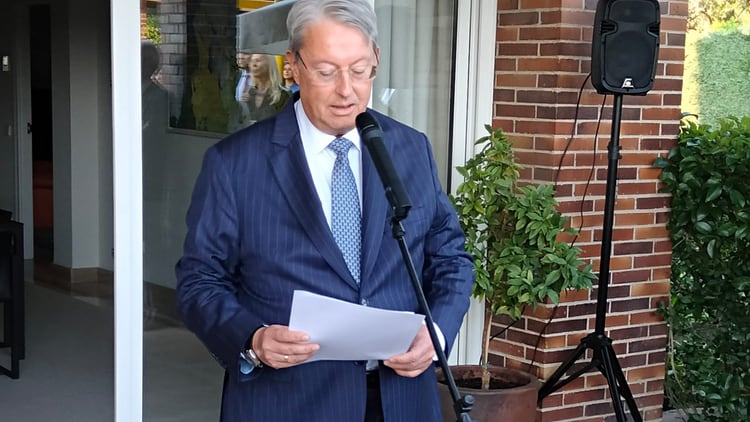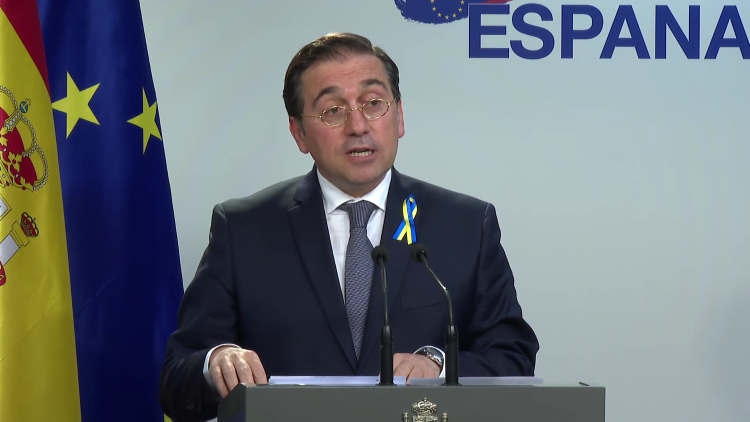The Diplomat
Luxembourg’s ambassador to Spain, Christian Biever, stressed on Thursday that the Grand Duchy is a clear exponent of sustainable mobility, because it is the only country in the world to offer free public transport throughout its territory.
Biever hosted a reception at his residence to celebrate the National Day, which was attended by numerous guests, including the ambassadors of the Netherlands, South Korea, Czech Republic, Kazakhstan, Oman, Cyprus, Croatia, Austria, Monaco, Panama, Lithuania, Switzerland and Ukraine, as well as the Nuncio of His Holiness. The Ministry of Foreign Affairs was represented by the Director General for Western, Central and Southeast Europe, Raquel Gómez-Cambronero, and the Ambassadors’ Introducer, María Sebastián de Erice.
In his speech, after listening to the national anthems of Luxembourg and Spain, the ambassador stressed that we are living in times that require collaboration and dialogue between nations, and added that one of his main tasks is to promote understanding and open communication between the two countries. Our countries,” he said, “share common interests, common challenges and, no doubt, a common future. We must work together, with respect and understanding, to address global issues such as peace, climate change, security, health and equality, among others. Only through cooperation and solidarity can we find lasting and sustainable solutions”.
He went on to condemn Russia’s aggression against Ukraine, greeting in particular the Ukrainian ambassador present at the reception and stating that “at a time when the Ukrainian people are suffering a terrible ordeal, an attack on the most fundamental values and rights, it is up to us to hold high the European values that define us and unite us”.
Christian Biever also stated that Luxembourg actively pursues a feminist foreign policy, promoting gender equality in international fora, defending women’s social and sexual rights in political dialogue and investing in international programmes that especially benefit women’s development.
Noting that her country encourages better representation of women in positions of responsibility and leadership in public administration and private companies, she recalled that last March, on the occasion of International Women’s Rights Day, some 70 financial actors signed the Charter “Luxembourg Women in Finance” which aims to improve gender diversity in the financial arena by setting internal targets for women’s representation within the company and its management. “We found another sign of support for women on the Luxembourg Stock Exchange, with the so-called “gender bonds”, which support gender equality,” he added.
The ambassador also mentioned the importance of sustainable development in Luxembourg, which spends more than 1 per cent of its GDP on development aid, targeting the most vulnerable people and with a special emphasis on women and children.
Another example of Luxembourg’s drive for sustainable development,” he said, “is its environmentally friendly policies, one of its top priorities, setting ambitious targets to combat the growing threat of climate change, and supporting ambitious European targets”. In this regard, he said that a clear example of this is the National Mobility Plan 2035, which was awarded first prize at the World Conference on Public Transport held in Barcelona on 4 June.
The ambassador said that the Luxembourg mobility plan represents a considerable improvement in the quality of life in urban areas, promoting public transport and positioning it as the backbone of urban and local mobility, and stressed that the Grand Duchy is the only country to offer free public transport throughout its territory from 2020, and that it is therefore a clear example of sustainable mobility.
He also considered that the visit to Spain by the President of the Luxembourg Chamber of Deputies, Fernand Etgen, had strengthened parliamentary cooperation between the two countries.
Christian Biever said that, as ambassador, his task was to strengthen bilateral ties, promote trade, investment and culture, and ensure that his country’s voice was heard on the international stage.
In the cultural sphere, he highlighted the figure of the recently deceased, Europe-wide award-winning poet Anise Koltz, and encouraged those present to read her work, describing her as “a clear exponent of the Grand Duchy’s multiculturalism and multilingualism”.









